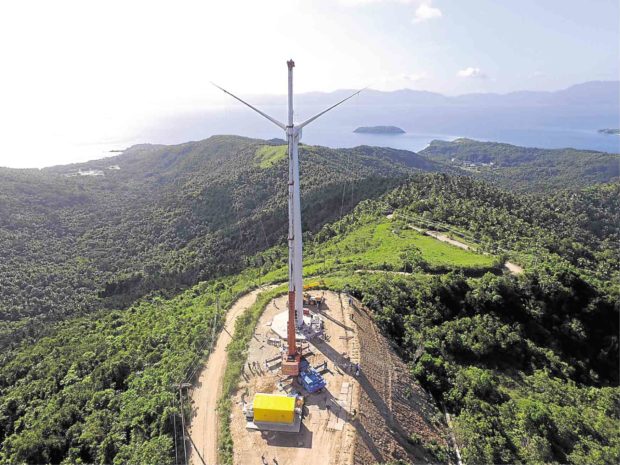
ROMBLON TURBINES Romblon province has tapped wind as another source of clean energy through the installation of wind turbines in Romblon town. The plant will be commissioned this month. CONTRIBUTED PHOTO
The Romblon Electric Cooperative Inc. (Romelco) will begin commissioning this month its first three wind turbines to generate power supply for the province’s island municipalities.
Rene Fajilagutan, Romelco general manager, said the 900-kilowatt turbines, each installed in the hilly villages of Bagacay, Lonos and Agnay, all in Romblon town, would generate electricity for the island towns of Romblon, Banton and Corcuera. Another set of 900-kW wind turbines will be installed in 2020.
The P242-million wind project is a joint venture between Romelco and Japanese firm Komaihaltec Inc. Half of the project cost was a grant from the Ministry of the Environment of Japan, Fajilagutan said.
Komaihaltec will lease the turbines to Romelco for the first four years, at P6.19 per kilowatt-hour without value-added taxes, before these are turned over to the power distributor.
‘Trendsetter’
The National Electrification Administration, in a statement on its website, described the venture as a “trendsetter” in terms of renewable energy in the Philippines.
“Actually, our vision is to transition from conventional [energy to clean energy] and [source] 90 percent [of the electricity supply] from renewable energy by 2020,” Fajilagutan said in a telephone interview.
Romelco services about 25,000 households in Romblon province.
Romelco, since 2010, has been running the 1,350-kW hydroelectric power plant on Sibuyan island (composed of Cajidiocan, San Fernando and Magdiwang towns), supplying electricity drawn from the Cantingas River at a rate lower than what has been approved by the Energy Regulatory Commission.
It has also been using a 30-kW solar-diesel hybrid generation system, which Fajilagutan said was the first of its kind used in the Philippines, for around 900 households on the island village of Cobrador over the last three years. —Maricar Cinco